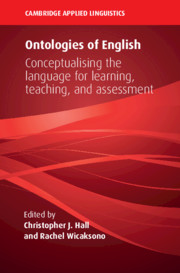Refine search
Actions for selected content:
8 results
5 - Native and Non-native Speakers of English in TESOL
- from Part II - English in/for L2 Learning and Teaching
-
-
- Book:
- Ontologies of English
- Published online:
- 24 December 2019
- Print publication:
- 02 January 2020, pp 80-98
-
- Chapter
- Export citation
14 - Exploring Standards-Based, Intelligibility-Based, and Complex Conceptions of English in a Lingua Franca Context
- from Part V - English in Lingua Franca Contexts
-
-
- Book:
- Ontologies of English
- Published online:
- 24 December 2019
- Print publication:
- 02 January 2020, pp 273-292
-
- Chapter
- Export citation
3 - English in the Real World
- from Part II - English in/for L2 Learning and Teaching
-
-
- Book:
- Ontologies of English
- Published online:
- 24 December 2019
- Print publication:
- 02 January 2020, pp 39-58
-
- Chapter
- Export citation
19 - Using Ontologies of English
- from Part VII - Commentary and Conclusions
-
-
- Book:
- Ontologies of English
- Published online:
- 24 December 2019
- Print publication:
- 02 January 2020, pp 368-376
-
- Chapter
- Export citation
2 - An Ontological Framework for English
- from Part I - Introduction
-
-
- Book:
- Ontologies of English
- Published online:
- 24 December 2019
- Print publication:
- 02 January 2020, pp 13-36
-
- Chapter
- Export citation
12 - What Is English in the Light of Lingua Franca Usage?
- from Part V - English in Lingua Franca Contexts
-
-
- Book:
- Ontologies of English
- Published online:
- 24 December 2019
- Print publication:
- 02 January 2020, pp 233-252
-
- Chapter
- Export citation
1 - Approaching Ontologies of English
- from Part I - Introduction
-
-
- Book:
- Ontologies of English
- Published online:
- 24 December 2019
- Print publication:
- 02 January 2020, pp 3-12
-
- Chapter
- Export citation

Ontologies of English
- Conceptualising the Language for Learning, Teaching, and Assessment
-
- Published online:
- 24 December 2019
- Print publication:
- 02 January 2020
